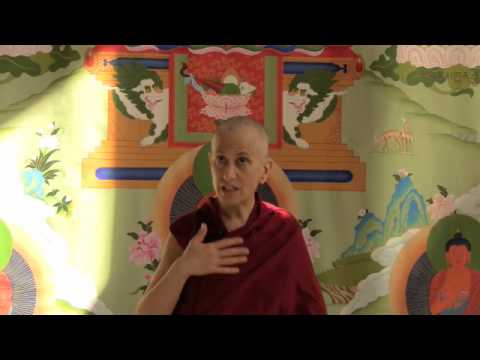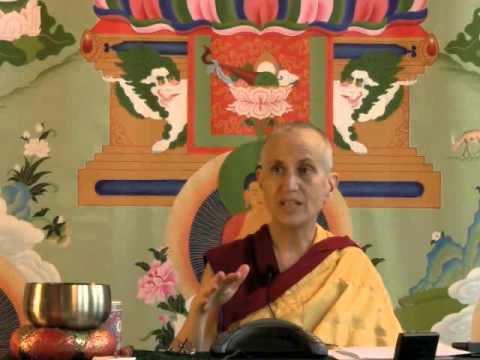Six root afflictions: Conceit and comparing
Stages of the Path #103: The Second Noble Truth
Part of a series of Bodhisattva's Breakfast Corner talks on the Stages of the Path (or Lamrim) as described in the Guru Puja text by Panchen Lama I Lobsang Chokyi Gyaltsen.
I’ve been talking about the six root afflictions. [laughter] Yes. Who are you rooting for? Not the afflictions, I hope!
We’ve covered attachment, anger, ignorance, and doubt. We are now on conceit. Sometimes conceit is translated as “pride,” but I think that could be confusing because there is a positive type of pride, like when you do a good job and you take pride in your work. That’s a good kind of pride; that’s not non-virtuous. We should want to do good work, and we should feel good about the good work we do. But here we’re talking about conceit, and I haven’t heard conceit ever used in a positive way.
They talk about seven different kinds of conceit. [laughter] There’s conceit where we are comparing ourselves to somebody who is actually superior to us, but we’re feeling superior to them. Somebody is better in whatever it is, but we think we’re better. Then the second one is where we’re equal with another in whatever talent or ability it is, but we still feel better than the other person. The third one is where we are better, but we have a lot of conceit about it.
This whole issue of conceit comes very much from comparing ourselves to others, which we do a lot. It’s just competition, isn’t it? We’re always taught competition is good, but I don’t think so—not always. Comparing ourselves to others is really inaccurate because we’re all unique individuals. We all have our own talents and abilities. Why should we compare ourselves to others with a mind that thinks better or worse or with a mind that feels I have to prove myself to them and be better than them?
When it comes to fixing stuff, I know a lot of people that are better than me. Comparing myself to others in that way is good, because then I won’t try to fix it. If I try I’ll probably just break it more. In certain areas, we assess our abilities and somebody else’s abilities, and we see they’re better than me at this skill or ability, and that’s fine. Or maybe we see that we are better than them at this. Again, that is fine. That doesn’t need to be conceit.
Conceit is the comparison of ourselves to others and being competitive that is very ego involved. It feels like our whole life, our whole self-esteem, is on the line. We think, “I’ve got to be better than this person, and even if I’m not, I’m going to say I am! And I’m going to beat them to a pulp, because if they’re better than me, then it means I’m useless and worthless.” We build up this conceit as a big prop to ignore real psychological issues that we need to take care of. We don’t solve those issues by being conceited, by being arrogant; we solve them by accepting who we are.
It’s quite interesting to take some time to look at the areas where you compare yourself to others, and how you come out in that comparison. Comparing ourselves to others leads not only to these first three kinds of conceit, but it can also lead to jealousy. If we don’t put ourselves up as better than these other people, then we might be jealous of them. You see, it’s all kind of contorted thoughts of trying to establish our self-worth, which we really don’t need to do. We’re worthwhile people anyway, just as we are.
Venerable Thubten Chodron
Venerable Chodron emphasizes the practical application of Buddha’s teachings in our daily lives and is especially skilled at explaining them in ways easily understood and practiced by Westerners. She is well known for her warm, humorous, and lucid teachings. She was ordained as a Buddhist nun in 1977 by Kyabje Ling Rinpoche in Dharamsala, India, and in 1986 she received bhikshuni (full) ordination in Taiwan. Read her full bio.


